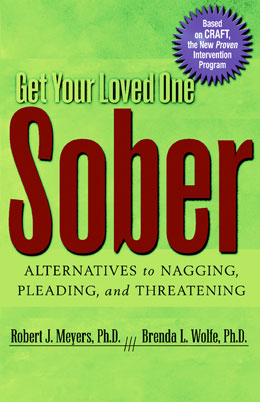
I can't decide about this book, Get Your Loved One Sober: Alternatives to Nagging, Pleading, and Threatening.
But anyway, the website references this book again and again, so I bought it. It is an alternative approach to the 12 steps and to the intervention model of addiction treatment.
One thing about the book is that it's probably much more useful if you're dealing with an addict in active addiction. It offers techniques to help you use something more like a positive rewards system to encourage your addict to stop the addictive behavior instead of nagging or bitching about things that bother you. For instance, say your addict comes home a little late and is clearly high, the book would recommend that you should tell your addicted spouse that you love him very much, but that you don't like being around him when he's high, and that you're going to go out with your girlfriends.
This approach does two things--one I think is very similar to the techniques I've been learning in Nar-Anon, and another is pretty much a polar opposite approach. The similarity is that wonderful part of the 12 steps for families--it teaches you to take care of yourself. In the above instance, instead of sitting home and freaking out and getting all worked up about how your man is fucked up, you go out with girlfriends, vent, and have a good time. Your personal interests are taken care of, and you're protecting your sanity and your serenity.
The thing that the book does that is quite different from the 12 step model, however, is it allows/encourages family members to take active responsibility for changing the addict's behavior. It becomes the job of the spouse to engage the addict's behavior head on by doing things to discourage him from using, which is pretty much a no-no in the 12 step programs, at least in how I understand them.
The book is definitely worth checking out, however, because it does offer a different perspective, and I've found in dealing with all of this that different perspectives help me, no matter what. Even when people's opinions contradict one another, it's really useful to hear what other people have to say, what techniques they've used to help themselves and thier addicts, and how they've kept their sanity. It helps to get outside your own head, you know?
Also, the book encourages you to remember the good things about your addict and to focus on providing a positive, healthy alternative to drug or alcohol use. By reminding my addict that he's a brilliant artist, for instance, I'm reminding him of things that he can do to make himself feel good and reminding myself of why I love him. I think this part of the book encourages healthy trends within relationships that are generally pretty messed up, and that's always good.

No comments:
Post a Comment